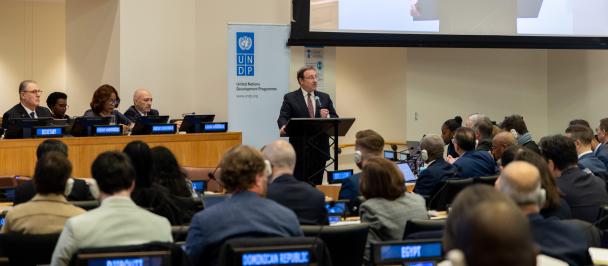Remarks at ECOSOC Special Meeting on response to Cyclone Idai in Mozambique, Malawi and Zimbabwe
Cyclone Idai in Mozambique, Malawi and Zimbabwe
April 2, 2019
As prepared for delivery.
Opening
H.E. President of the Economic and Social Council
H.E. Antonio Gumende, Permanent Representative of the Republic of Mozambique
H.E. Perks Master Clemency Ligoya, Permanent Representative of the Republic of Malawi
H.E. Frederik Musiiwa Makamure Shava, Permanent Representative of the Republic of Zimbabwe
Excellencies,
Ladies and Gentlemen,
I would like to thank the President of the ECOSOC (Inga Rhonda King), the Under-Secretary-General for Humanitarian Affairs and Emergency Relief Coordinator (Mark Lowcock), and other key partners such as the World Food Programme, for holding this special meeting of the ECOSOC, bringing necessary attention to the devastating Cyclone Idai which has impacted the lives and livelihoods of millions of people in Malawi, Mozambique and Zimbabwe.
The severity of this crisis is a stark reminder of the impact of climate change when coupled with conditions of pervasive poverty, inequality and insecurity.
Apart from the many lives lost and livelihoods disrupted, we are seeing a particularly severe impact on public and private infrastructure in all three affected countries. The cross-border and sub-regional ramifications of the disaster are also clearly apparent.
These disasters are growing in severity and impact and are contributing to the low development indicators in the region. Most of the people affected are those with the least capacity to cope with the impact of disasters.
This is why, our recovery efforts must be anchored in the twin principles of ‘building back better’ and ‘reaching the furthest behind first’, be it women, children, or persons with disabilities.
In light of these challenges, the prompt response of national governments and the timely, joined-up efforts of UN agencies, including UNDP, has been essential in saving lives, finding shelter for the displaced and responding to acute challenges on the ground.
Aligning with the ongoing humanitarian and emergency response, and in excellent collaboration with our humanitarian colleagues, UNDP’s extensive presence on the ground has allowed us to rapidly surge and assess needs for early recovery and longer term resilience and development in the three affected countries.
UNDP’s response
As regards to UNDP’s contributions to the response efforts, we have deployed SURGE capacities to all three countries in the form of technical experts in disaster risk reduction, recovery, resilience building and livelihoods.
Programme funds amounting to US $1.75 million have been made available for assessment, coordination and early recovery programming; with additional technical assets and programmable resources to be deployed following the conclusion of the SURGE Planning Mission.
UNDP has also initiated a rapid socio-economic impact assessment to generate up-to-date qualitative and quantitative information in a number of areas including: the impact upon the affected population and the economy, the availability of goods, as well as the cost implications for recovery.
The results of the assessment will inform immediate recovery programming, while supporting the affected countries in engaging in strategic activities to build resilience while responding to critical early recovery needs.
We will also increase support to the electoral cycle, and to the national electoral bodies in Malawi and Mozambique to repair and replace essential equipment and assets so that elections can proceed as scheduled.
In partnership with the UN system, the World Bank and the European Union, we are preparing a Post Disaster Needs Assessment in the three affected countries which will provide a roadmap for recovery in the short-, medium- and long- term. The assessment will also identify priority disaster risk reduction and climate adaptation measures to guide necessary interventions in these areas.
An important asset to the crisis response and recovery efforts will be UNDP’s long-standing efforts in strengthening disaster risk reduction and preparedness capacities in Malawi, Mozambique and Zimbabwe.
Our network includes partnerships in strengthening risk governance systems at national and sub-national levels, establishing early warning systems, and supporting community level preparedness and resilience building.
For example, in Mozambique with the support of UNDP, key sectors such as agriculture, education, health, infrastructure and energy are now integrating disaster risk reduction and climate adaptation components into planning, backed by budget allocations.
In Zimbabwe, UNDP and partners are implementing the Zimbabwe Resilience Building Fund. This work provides the evidence base for policy making on resilience; strengthens resilience capacities of at-risk communities and provides cost effective response to emergencies via existing safety nets and other relevant programmes.
In Malawi, UNDP with support from the Green Climate Fund, is providing accurate weather forecasts and expanding community-based early warning systems to 75% of the districts to benefit 2 million people.
Beyond our work in livelihoods support, economic recovery and resilience building- we will support countries in the review of relevant policies such as those on waste and water management, environment and biodiversity to ensure that these contribute to reducing the impact of future disasters.
Closing
In closing, I would like to reiterate UNDP’s strong commitment to work with the governments, regional intergovernmental organizations, international financial institutions and the private sector in the recovery of Malawi, Mozambique and Zimbabwe. This will include resilience-building while aiming to achieve the SDGs.
UNDP will also fully utilize its “integrator” role in mobilizing partners around recovery, resilience and long-term development planning and impact.
As the United Nations, we must ensure that the humanitarian and development nexus is effectively brought to bear in helping the affected countries recover as quickly as possible while continuing to make concrete progress in their development pathways.
Thank you.

 Locations
Locations




